| Srl | Item |
| 1 |
ID:
113385
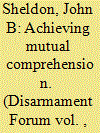

|
|
|
| 2 |
ID:
130048


|
|
|
|
|
| Publication |
2014.
|
| Summary/Abstract |
The role of unacknowledged classified programs remains an enigma for fully understanding activities in space and the study of astropolitics. Classified programs by law are not publicly announced, and remain inaccessible to all except those with valid security clearances to be briefed about them. In the United States, waived Unacknowledged Special Access Programs are the most highly classified programs conducted by the military and intelligence community. The same classification protocols are also required of private contractors working with U.S. military departments and intelligence agencies on classified programs. As space continues to grow in its national security significance, the number of these unacknowledged programs pertaining to space is likely to grow significantly from its current number. This requires adopting the necessary conceptual tools and methodological flexibility for investigating unacknowledged activities in space. This also extends to evidence concerning unidentified flying objects and extraterrestrial life. This article suggests that "exopolitics" is a unique multidisciplinary approach to extraterrestrial life that offers a helpful set of conceptual tools for studying unacknowledged space activities, and complements the field of astropolitics.
|
|
|
|
|
|
|
|
|
|
|
|
|
|
|
|
| 3 |
ID:
171539
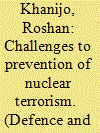

|
|
|
| 4 |
ID:
142686
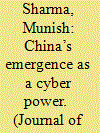

|
|
|
|
|
| Summary/Abstract |
Cyberspace is increasingly becoming an area of contestation among nation states. Similar to the physical domains of land, sea, air and space, superiority in the cyber domain enables a nation state to exert its cyber power. In recent years, China has invested colossal amounts in building the requisite infrastructure and capabilities of its armed forces as well as governance practices to advance towards ‘informationalisation’. This article seeks to discern the motives, threats, objectives, strategy and intent that drive China to amass cyber power.
|
|
|
|
|
|
|
|
|
|
|
|
|
|
|
|
| 5 |
ID:
115795
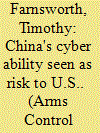

|
|
|
| 6 |
ID:
133611
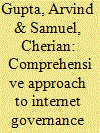

|
|
|
|
|
| Publication |
2014.
|
| Summary/Abstract |
The pressing issues around cyberspace revolve around internet governance, cybersecurity and drawing up rules of the road for the new domain of cyberwar. While each of these is at a different stage in its evolution cycle, cyberspace itself is facing a watershed moment as insecurities mount. The fragmentation of cyberspace seems inevitable unless there is accelerated movement on resolving the fundamental issues of internet governance and cybersecurity that have been hanging fire for well over a decade.
|
|
|
|
|
|
|
|
|
|
|
|
|
|
|
|
| 7 |
ID:
130212
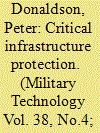

|
|
|
| 8 |
ID:
019327
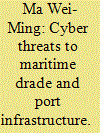

|
|
|
|
|
| Publication |
April 2001.
|
| Description |
77-92
|
|
|
|
|
|
|
|
|
|
|
|
|
|
|
|
| 9 |
ID:
133609
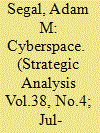

|
|
|
|
|
| Publication |
2014.
|
| Summary/Abstract |
In June 2013, President Obama met with President Xi Jinping at Sunnylands, California. The meeting was seen as a chance for the two leaders to get to know each other in a relatively informal setting so they could address the growing mistrust between their countries. While maritime disputes, trade tensions and differences over how to contain the North Korean and Iranian nuclear programmes were high on the agenda, cyber security-in particular Chinese cyber espionage-was the defining issue of this unusual summit. For the US, the meeting between the two presidents was the culmination of a long campaign to pressure Beijing to reduce the scope and scale of Chinese cyber attacks on the United States.
|
|
|
|
|
|
|
|
|
|
|
|
|
|
|
|
| 10 |
ID:
133610
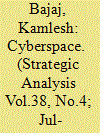

|
|
|
|
|
| Publication |
2014.
|
| Summary/Abstract |
Just as the world was beginning to understand the various dimensions of cyberspace in general, and internet governance in particular, it received the rude shock of the Snowden revelations about the global surveillance carried out by the United States National Security Agency (NSA) in the name of counterterrorism. All kinds of electronic communications of US citizens and non-citizens alike were monitored. Phone tapping and electronic interception were part of this huge operation to collect a haystack of data in the hope of detecting terrorist links to protect national security. The stories that are emerging from the NSA documents made available by Edward Snowden since June 2013 in the Guardian, the New York Times, Der Spiegel and the Washington Post continue to surprise, enrage or shame people depending upon the nation or group that they belong to. The whole world, including those who work for spy agencies, is surprised at the enormity of the scale of surveillance.
|
|
|
|
|
|
|
|
|
|
|
|
|
|
|
|
| 11 |
ID:
151072
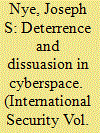

|
|
|
|
|
| Summary/Abstract |
Understanding deterrence and dissuasion in cyberspace is often difficult because our minds are captured by Cold War images of massive retaliation to a nuclear attack by nuclear means. The analogy to nuclear deterrence is misleading, however, because many aspects of cyber behavior are more like other behaviors, such as crime, that states try (imperfectly) to deter. Preventing harm in cyberspace involves four complex mechanisms: threats of punishment, denial, entanglement, and norms. Even when punishment is used, deterrent threats need not be limited to cyber responses, and they may address general behavior as well as specific acts. Cyber threats are plentiful, often ambiguous, and difficult to attribute. Problems of attribution are said to limit deterrence and dissuasion in the cyber domain, but three of the major means—denial by defense, entanglement, and normative taboos—are not strongly hindered by the attribution problem. The effectiveness of different mechanisms depends on context, and the question of whether deterrence works in cyberspace depends on “who and what.” Not all cyberattacks are of equal importance; not all can be deterred; and not all rise to the level of significant national security threats. The lesson for policymakers is to focus on the most important attacks and to understand the context in which such attacks may occur and the full range of mechanisms available to prevent them.
|
|
|
|
|
|
|
|
|
|
|
|
|
|
|
|
| 12 |
ID:
125362
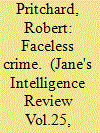

|
|
|
|
|
| Publication |
2013.
|
| Summary/Abstract |
As awareness of the need for online privacy grows, technology is increasingly becoming available to help internet users maintain anonymity, Robert Pritchard investigates illegal activities facilitated by such technology and the inherent problems in tacking it.
|
|
|
|
|
|
|
|
|
|
|
|
|
|
|
|
| 13 |
ID:
134052
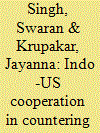

|
|
|
|
|
| Publication |
2014.
|
| Summary/Abstract |
The increasing dependence on Information and Communication Technologies (ICTs) has unleashed a whole new genre of cyber terrorism. Cyber attacks on critical infrastructure, online hate propaganda and use of the internet for recruiting, planning and effecting terrorist attacks have become new frontiers of terrorism. The ubiquitous cyberspace has expanded terrorism structures and transformed their operations. Given their democratic traditions of privileging basic freedoms, such as individual privacy, and the unprecedented spread of the internet, India and the US face a formidable challenge in confronting cyber terrorism. While both countries share a strong political affinity to cooperate and have set up institutional mechanisms to secure cyberspace, divergences in their approaches and a lack of clarity and consensus on their immediate and long-term goals continue to be their fundamental limitations. In spite of their strong commitment to work together, their divergent approaches to internet governance and episodes like the WikiLeaks and Snowden affairs have only re-enforced their continuing trust deficit.
|
|
|
|
|
|
|
|
|
|
|
|
|
|
|
|
| 14 |
ID:
133608
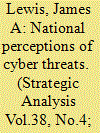

|
|
|
|
|
| Publication |
2014.
|
| Summary/Abstract |
The issue of cybersecurity as an issue for international security has captured the attention of policy makers around the world. A 2011 United Nations (UN) assessment found that only 68 of the 193 UN member states had cybersecurity programmes. By 2012, this had increased to 114 countries. Of the nations with cybersecurity programmes, roughly 40 have publicly identified cybersecurity as a military concern in national military strategies or defence white papers.
|
|
|
|
|
|
|
|
|
|
|
|
|
|
|
|
| 15 |
ID:
179202
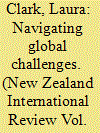

|
|
|
|
|
| Summary/Abstract |
The elements in which New Zealand and the United Kingdom find themselves include the prevailing winds, the storms coming at them across the horizon and the threats to their security and way of life. Safely navigating these seas demands the careful determination of priorities over the next ten years, and of how they mean to act on the world stage. Important questions arise as to what that means in terms of tools and capability; relationships; and ability to work together. The United Kingdom is committed to working together with New Zealand, both bilaterally and multilaterally, to tackle global challenges and promote global goods.
|
|
|
|
|
|
|
|
|
|
|
|
|
|
|
|
| 16 |
ID:
189426
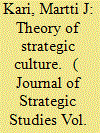

|
|
|
|
|
| Summary/Abstract |
The strategic environment is evolving rapidly with the recognition of cyberspace as a domain of warfare. The increased interest in cyber as a part of defence has heightened the need for theoretical tools suitable to assess cyber threat perceptions and responses to these threats. Drawing from previous research, we will formulate an analytical framework to study the formation of Russian thinking on cyber threats as a part of Russian strategic culture. This article identifies a sense of vulnerability, the narrative of Russia as a besieged fortress and the technological inferiority of Russia as specific factors influencing Russian cyber threat perception.
|
|
|
|
|
|
|
|
|
|
|
|
|
|
|
|
| 17 |
ID:
091892
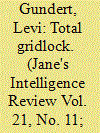

|
|
|
|
|
| Publication |
2009.
|
| Summary/Abstract |
Cyber security is becoming an increasingly important issue, as governments and companies evaluate the potential risks that cyber attacks could pose. In May, US President Barack Obama announced a new cyber security strategy to coordinate national cyber security initiatives, warning that the cyber threat is one of the most serious economic and national security challenges facing the United States.
|
|
|
|
|
|
|
|
|
|
|
|
|
|
|
|